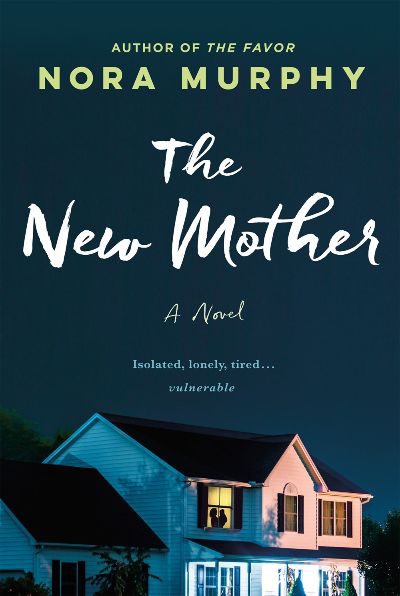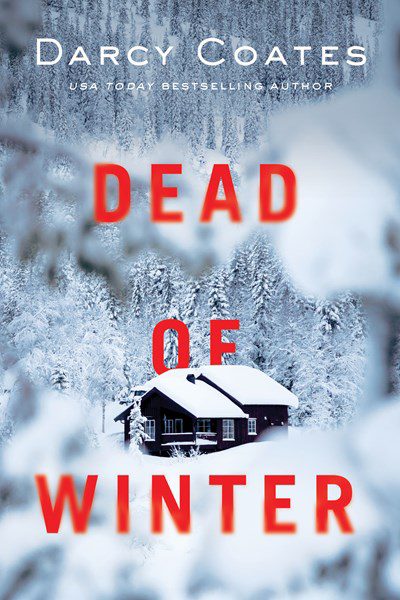Thrillers, for me, are like palate cleansers. Every few weeks, I need to immerse myself in an action-packed, plot-driven narrative full of fear, anxiety, and tension that pushes me to read at full throttle. But I was in no way prepared for the absolute terror of The Last One. Fifty-something Caz wakes up on an ocean liner that’s hugely similar to the Queen Mary 2—it’s even on a transatlantic voyage, QM2’s signature trip—only to find that her partner, Pete, is missing. But that’s just the beginning. It seems that every other passenger and the entire crew is AWOL. The idea of rattling across the Atlantic in a deserted ocean liner is scary enough, but when Caz discovers three more passengers, things take a decidedly darker turn. What’s incredible is how far Dean goes with his storyline, pushing relentlessly to up the fear factor, creating one scenario more terrifying than the last. At the same time, we learn about Caz’s troubled family, and what in her past helps to keep her alive in the present. One wild ride that is not to be missed.
Suspense
Having a new baby is hard for anyone, but for lawyer Natalie the daily grind of keeping up with baby Oliver while her husband goes to work seems like both thankless drudgery and the most important job in the world, one at which she’s failing miserably. All Oliver wants to do is nurse, leaving Natalie little time to sleep, and when she does collapse into bed, she lies awake fretting about her failures. So when Paul, a kindly neighbor and a stay-at-home dad, slowly gains her trust and seems to be the only one who understands—Oliver even likes him!—Natalie is quickly drawn into his care. Erin, his wife, a stern, perfect woman whom he has come to loathe, is not a fan of Natalie. The young woman’s presence, and her growing relationship with Paul, brings back painful, humiliating memories for Erin, including his transgression with the woman who lived in Natalie’s house before, whose family, readers learn, moved in an odd hurry. The hormonal, messy, and puzzling time warp of the first months of life with a new baby are the perfect backdrop for a psychological thriller, and this one will keep parents especially rapt. While you wait for it, try Murphy’s The Favor, another absorbing domestic drama.
Liv is imprisoned in a rusting shipping container in rural Alaska, her captor her ex-husband, whom she’s tracked down after he faked his death and ran from their marriage and disabled son. He’s now living with a new partner in a proto-cult based on the writings of a guru who espouses pleasure above all else and is happy to philosophize endlessly while harsh conditions threaten his family. Over time, as Liv gains entry to Mark’s house and to some of his more sordid secrets, she plots her escape, one that it seems impossible being phone- and car-less as she is. Townsend takes us on a tense ride through family and cult dynamics, along the way treating us to a memorable look at female and parental resilience; the up-close look at a narcissistic patriarch who’s setting himself up to fail is a bonus. For fans of wilderness thrillers such as Karen Dionne’s The Marsh King’s Daughter.
Faith Harrington’s mother is dying. It’s no surprise to Faith, who can see others’ deaths when she looks in their eyes, though she can only guess at the timing of the demise. This ability revealed itself when Faith was a child and she saw her brother’s drowning ahead of time, an event that left the members of her family’s circus thinking that the girl, like her grandmother who had even more such powers, was cursed. Since then, Faith’s been pushed to the periphery of her family’s traveling and performances. But when she enters the big tent and accidentally sees a performer collapse, and reassures his daughter that she’s seen his death and it’s when he looks much older, it’s the beginning of chaos and danger surrounding the strange talent. The question of whether fate can be changed will linger with readers after this thoughtful, atmospheric book that features a startling twist at the end. Remember Erin Morgenstern’s The Night Circus? This is for fans of that who are ready for something darker, as well as readers who like to learn about intriguing subcultures.
A near-perfect novel of utopia-gone-wrong. Liz and her three female friends take a vacation together every year, typically somewhere with plenty of sun and a good bartender. But this year it’s Liz’s turn to pick, and needing a radical reset, she decides they’ll go mountain climbing in the gorgeous wilds of Norway. Gorgeous, but deadly. And—as the locals point out, not a climb for the inexperienced—which is all of them. Here’s a bit of what could go wrong: creepy, predatory males spying on them; killer storms; mud slides; loss of all provisions; no cell phone reception; and interference from a drug cartel. In addition, each woman manages to screw things up in her own way, like losing the trail or spraining an ankle, regularly setting them at one another’s throats. The novel builds slowly, we get plenty of insight into each woman’s personal life and the baggage she hopes to leave on the mountain, while the suspense blossoms beautifully. Richly atmospheric, well-plotted, with plenty of insight into female friendship, this should appeal to fans of Lisa Unger and Claire Douglas.
How does Stacey Abrams do it all? Last year, she ran for Governor of Georgia while maintaining her voting-rights activism and apparently writing this book. The second in the Avery Keene duology (after While Justice Sleeps) sees Supreme Court clerk Keene back in the lawyer/amateur detective seat. As the book opens, she’s being grilled by Congress about allegations she’s brought to light regarding corruption and crimes by disgraced President Brandon Stokes. Readers won’t help but imagine him as having a certain orange hue, and it seems no coincidence that his initials are BS. Other parts of the book seem taken from current headlines, too, enriching an exciting tale of blackmailing of federal judges and imminent nationwide technological sabotage that seems all too possible. At the heart of it are Keene’s smarts, eidetic memory, and integrity—this is a woman who’s underestimated at her foes’ peril, and there’s plenty of peril. Details of the inner workings of Washington, DC are strewn throughout the work and raise the interest level even further. For a mini-course in political intrigue, try this and James Comey’s Central Park West, which is out later in May.
Did you like Emma Donoughue’s Room? French journalist Michallon’s debut (written in English as a challenge to herself) is for you. Trapped in a garden shed for years is Rachel—well, that’s the name her captor has given her–who’s chained to the floor, fed barely enough, and kept in mortal fear. “I won’t be happy” is her captor’s threat that keeps her in line, and maintaining his brittle composure is her daily struggle. She knows she’s next to his home where he has the life she longs for, with freedom and family. Suddenly, she gets the chance to partake in it, and maybe to escape—but is it all a trick? At the same time, we meet her captor, Aidan, in the outside world, where he’s barely recognizable as a monster who keeps a sex slave. He and his teenage daughter, Cecilia, are the focus of community sympathy and help following the recent death, from cancer, of Aidan’s young wife. The women are the stars of this book, and their inner lives and relationships will draw readers in from page one. “Rachel” obviously takes the central role, with Michallon doing a superb job of portraying her as a well-rounded character who lives in one room, her hopes, memories, and agonies doing the heavy lifting. But there’s also Cecilia, a girl we get to know intimately as she flounders in her grief and tries to make tentative forays outside her father’s strict control, and Emily, a woman who gets to know Aidan in the outside world and shows us a side of him, and of this kind of crime, that’s unexpected and compelling. Psychological drama at its best; the ending had me literally sitting forward, propelling the women on.
Have we been holding back on the raw carnage? If so, this book will more than make up for that. It’s winter, and Christa, our narrator, and her boyfriend, Kiernan, join a tour group of eight headed to a splendid lodge in the Rocky Mountains. But en route the weather turns nasty, a huge pine tree blocks their road, and they are forced to seek shelter in an abandoned hunting cabin as the snow piles up. Alarm bells ringing yet? The plot is squarely in the tradition of locked-room mysteries, more often locked mansions or islands these days, and we can expect our eight participants to slowly get bumped off thanks to poison, asphyxiation, or other genteel means. Well, that’s half correct. For most of the novel, the characters are locked in, thanks to the storm, unable to stray much beyond the cabin. But death in this novel is anything but genteel. In fact, it’s downright terrifying. But even more disturbing is Christa’s plight; obsessively assessing her peers to determine whom, if anyone, she can trust. Coates is also a horror author, and there’s a good dollop of that genre woven through this novel of high suspense. Keep a cat or two on your lap when reading this one.
I’ll be 51 this Sunday and I read two books a week. It adds up, and this is the best I’ve ever read. As it’s very far from an ordinary read , I can’t write a review as I normally would. The plot and characters are fantastic, compelling, memorable, surprising…but the book is more than anything a magic box. Trussoni also has an unsettling ability to mention everything of interest and everything that has come up lately. I thought about making a website that would emulate the ability of a pile of transparency sheets to create a composite image, and that process is mentioned. I learned about the idea of the singularity this week–the possible future time when technological growth becomes uncontrollable–and it’s there. A central theme is a kind of mythical creature I had mentioned to me recently. And the characters, and of course the author, see into the reader in other ways, with the bizarre turns in the tale perfectly allowing every nuance of the strange folks within to emerge, but also startling the consumer of this sorcery on every page. What’s the book about? Everything, but there’s a framework. A puzzle maker, who, through a brain injury, gains the remarkable ability to see “that particular kind of order that [distinguishes] a puzzle from everything else on the planet,” meets a prisoner who hands him a drawing, a puzzle he can’t even begin to unlock. It leads him to letters and a diary that describe a dangerous quest to “lift the veil between the human and the Divine and [stare] directly into the eyes of God.” There’s homework before you read this so that you can be in the right frame of mind to take in its wonder. Read Brian Selznick’s The Invention of Hugo Cabret, Shaun Tan’s The Arrival, Stephen King’s Pet Sematary, Aimee Pokwatka’s Self Portrait with Nothing, and Ray Kurzweil’s The Singularity is Near. And then clear a weekend.
It’s clear that Isabel Cañas wants all the genres—speculative, historical, horror, romance, mystery—and why not? She does such a magical job of blending them together, as this follow-up to the Gothic The Hacienda makes clear. Set during the Mexican-American War, known in Mexico as intervención estadounidense en México (United States intervention in Mexico), at its core this is a Romance. Nena, daughter of a Texas rancher, and Néstor, son of vaqueros, are young teens who’ve grown up together. During a late-night excursion on the ranch—in search of lost treasure—Nena is attacked by a beast that drains her of her blood. Feeling no pulse and assuming she’s dead, Néstor flees. But Nena survives, and years later, amid the war, they meet again. He’s a member of the calvary, she a curandera, or healer. Their reunion shocks them both, with Nena unleashing her anger at Néstor for abandoning her. But soon there are bigger issues at hand, including attacks from the Yanquis and bloodthirsty creatures lurking in the dark. Compelling, steamy, and with a wonderful perspective on the War, this unique tale is not to be missed.










